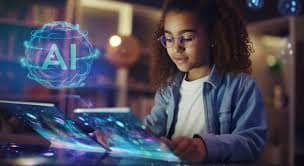Introduction
In 2025, education is experiencing a revolutionary shift driven by artificial intelligence (AI). From personalized learning to intelligent tutoring systems, AI is reshaping how students acquire knowledge, how teachers deliver lessons, and how institutions manage operations. Let’s explore how AI-powered education is building the future of learning.
How AI Is Transforming Education
1. Personalized Learning
AI algorithms analyze students’ strengths, weaknesses, and learning styles to create customized learning paths. Platforms like Squirrel AI and Century Tech adapt in real-time, offering targeted resources to maximize each learner’s potential.
2. Intelligent Tutoring Systems
AI tutors like Carnegie Learning provide instant feedback, guide students through complex problems, and simulate one-on-one instruction. This technology allows for scalable, high-quality education without replacing human teachers.
3. Automation of Administrative Tasks
AI-powered systems automate grading, attendance, scheduling, and student support inquiries. This frees up teachers’ time to focus on teaching, creativity, and student engagement.
Benefits of AI in Education
- Accessibility: Students from remote areas can access quality education through AI-driven online platforms.
- Inclusivity: AI helps tailor learning experiences for students with disabilities through adaptive technologies.
- Engagement: Gamification and immersive AI tools enhance student participation and motivation.
- Data-Driven Insights: Educators can track student progress in real-time and adjust strategies accordingly.
Challenges and Ethical Considerations
Despite its advantages, AI in education raises concerns about data privacy, bias in algorithms, and the digital divide. Institutions must prioritize ethical AI deployment, transparency, and equitable access for all students.
The Future Outlook
By 2030, AI is expected to be deeply integrated into all levels of education. Predictive analytics will anticipate student needs, virtual reality will create immersive learning environments, and lifelong learning will become the norm, supported by smart, adaptive technologies.
Conclusion
The rise of AI-powered education marks a defining moment in human development. By embracing the power of artificial intelligence responsibly, we can create a smarter, more inclusive, and more innovative future for learners around the world.
Sources and Further Reading



